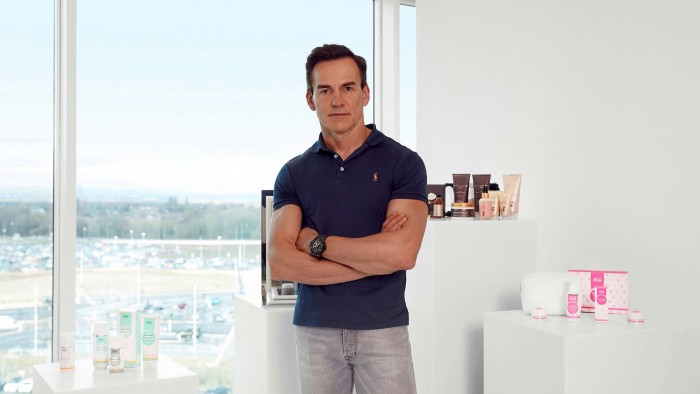Hut Group lifts revenue forecast as UK retail winners emerge

Roula Khalaf, Editor of the FT, selects her favourite stories in this weekly newsletter.
The Hut Group, the online retailer that floated on the stock market in September, has upgraded its revenue forecasts after sales rose more than 50 per cent in the final months of last year.
The Manchester-based group, founded by Matthew Moulding, said trading in its fourth quarter was ahead of the forecasts it made little more than a month ago.
Sales in the final three months of 2020 were £559m, 51 per cent higher than a year earlier, and ahead of a previous estimate of 40 to 45 per cent growth. The company also increased forecasts for 2021, though this largely reflected the acquisition of Dermstore last month
Shares in The Hut Group have risen almost 60 per cent since its initial public offering, and its market value, at £7.6bn, is well above the threshold required to trigger large incentive payments to a number of staff, including Mr Moulding. The company runs beauty websites Lookfantastic and Glossybox and also has own-label health and nutrition businesses, such as Myprotein.
Growth was particularly strong at The Hut Group’s online beauty business, where revenues rose 66 per cent to £298m.
The company’s announcement was one of a flurry of trading updates on Tuesday that showed many UK retailers continuing to prosper despite the alarming resurgence of coronavirus in the UK.
Very Group, the credit-based online retailer owned by the Barclay brothers, reported strong growth over the period that encompassed Black Friday and Christmas. Retail sales rose 18 per cent as consumers loaded up on homewares and electronics.
There was also upbeat commentary from DIY conglomerate Kingfisher and Warhammer owner Games Workshop, both of which have large store estates.
Kingfisher said it expected full-year adjusted pre-tax profit of about £740m, a 6 per cent increase on current estimates. Sales in the quarter to January 9 were up 16.9 per cent.
Games Workshop said half-year pre-tax profit rose more than 50 per cent to £91.6m, which was hailed by its chief executive as “a cracking performance”.
Although these retailers are very different, they have all benefited from consumers being barred from eating out or going on holiday for large parts of the year.
Henry Birch, chief executive of Very, said shoppers’ initial alarm over the impact of Covid-19 on their finances had eased. “We offered payment holidays to our credit customers but only 3 per cent took them up — and that’s now down to 1 per cent,” he said. Instead, they had been paying off loans.
He pointed to home furnishings as an example of the greater acceptance of ecommerce. “People are becoming more comfortable buying big home items online,” he said.
Adam Cochrane, retail analyst at Citigroup, said the pile up of savings caused by working from home and the closures of leisure and hospitality had been unprecedented.
“The savings ratio was up over 25 per cent during the second quarter and stayed at 16 to 17 per cent in the third. The only time it’s got near those levels in the past was during the early 1990s recession,” he said.
Proportionately more people are buying as opposed to just browsing. “We have seen that in a reduced returns rate . . . shoppers have definitely become more purposeful,” said Mr Birch.
Mr Cochrane agreed that financially robust retailers had been much better placed to react to the pandemic’s challenges.
“The online demand was there and companies that had the flexibility to move quickly were able to exploit it,” he said.
Retailers’ share prices, hit hard when the first UK lockdown was announced in March last year, have rebounded strongly. Kingfisher is up 36 per cent over the past year; Games Workshop’s market value is almost £4bn.
That is prompting more interest in flotations; cards and gifts group Moonpig said on Tuesday it would follow footwear brand Dr Martens on to the stock market.
“We’re a profitable 20-year-old business with a real record. We’re ready to be a public company,” said Moonpig’s chief executive, Nickyl Raithatha.
The big unknown is where the proportion of online sales will settle. Mr Raithatha said he was confident Moonpig — which is benefiting as people send cards instead of attending parties — would emerge from the pandemic “larger and stronger than we were coming into it”.
“There will be some kind of reversion to the norm. But we will have a significantly larger customer base and more reach.”
Comments